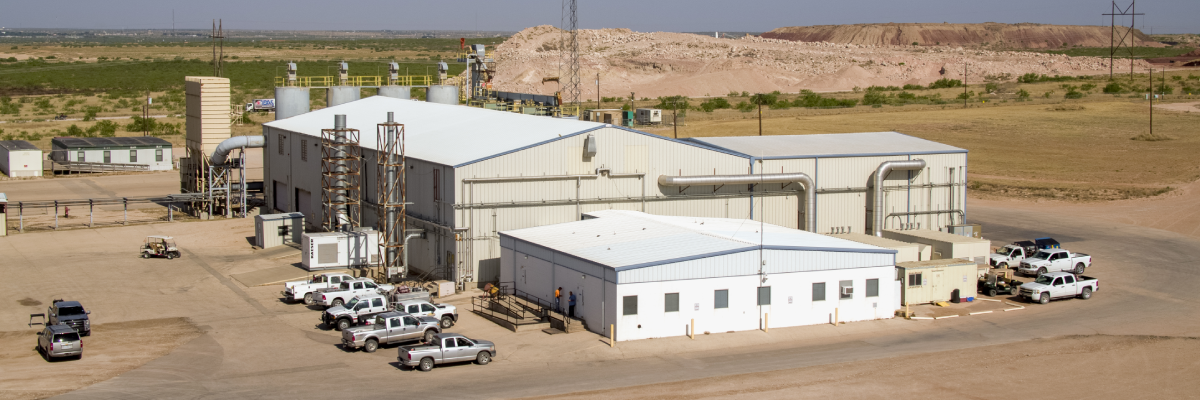
Types of Waste
- Inorganic waste streams including acids, bases, and wastes contaminated with metals
- Organic waste streams (with concentration limitations)
- Water-reactive inorganic materials such as elemental lithium, sodium, etc.
- MLLW with a high content of volatile organic compounds (VOC) can be treated on a case-by-case basis
- Hazardous and non-hazardous wastes mixed with Class A, B, C, and Greater than Class C (GTCC) LLW, and transuranic radioactive waste (TRU)
Treatment Technologies
- Chemical oxidation
- Chemical reduction
- Deactivation
- Micro- and macro-encapsulation (debris only)
- Neutralization
- Stabilization
- Controlled reaction
- Dewatering Services
WCS is authorized for the receipt, processing and storage of radioactive waste, and for the non-thermal treatment of:
- Ignitable, corrosive, toxic, selective reactive, and non-hazardous wastes
- Liquids, sludges, solids, lab packs in approved containers, and liquids in bulk tankers
Additionally, WCS obtained a Special Nuclear Material (SNM) exemption from the U.S Nuclear Regulatory Commission, which was approved by the Texas Commission on Environmental Quality (TCEQ). This exemption limits SNM receipt for processing, treatment, or storage based on maximum concentrations versus total grams; thus, WCS does not have a gram possession limit.
WCS’ processing capabilities include a negative pressure Mixed-Waste Treatment Facility (MWTF) dedicated to the processing and treatment of Low-level Radioactive Waste (LLW) and Mixed Low-level Radioactive Waste (MLLW). This facility includes more than 20,000 square feet of treatment and staging area with an 85-cubed-yard capacity mixing pan. There is an isolated treatment room with an airlock and a dedicated ventilation system within the MWTF. Double containment is provided in this room as necessary, for treatment of high-dispersal waste.
Capabilities
- Resource Conservation and Recovery Act (RCRA) and Toxic Substance Control Act (TSCA) wastes treated in the Stabilization Facility
- Mixed Low Level Waste (MLLW) treated in the Mixed Waste Treatment Facility (MWTF) under negative-pressure in an 85 cubic yards pan. Additional double and triple containment is available
- Decontamination, segregation, and sorting LLW and MLLW
- Free release of solid articles of LLW and MLLW
- LLW and MLLW characterization
- Stabilization, consolidation, shredding, and repackaging of RCRA, TSCA, LLW, and MLLW, including K061 contaminated with Cesium and Americium
- Dewatering services are provided for disposals that require it. At WCS, our dewatering process leaves your waste as dry as possible and helps ensure that our facilities remain the safest in the nation.
- Shredding of debris so that it can be treated by methods other than encapsulation
Resin and Filter Dewatering/Void Remediation Services
WCS provides resin and filter dewatering and void remediation services for containers that require dewatering or are not 85% full for disposal in the CWF. This service allows our customers to reduce the time and personnel exposure necessary to meet these industry standard disposal requirements in a very cost-effective manner.
Filter Encapsulation Services
WCS provides filter encapsulation services in accordance with the NRC’s Branch Technical Position on Concentration Averaging (BTP/CA). Concentration averaging allows you to average the activity in the filters over a larger volume and weight achieved through encapsulation, which can result in a lower waste classification and associated disposal costs. It is possible for most Class B/C filters to be reclassified as A post encapsulation using concentration averaging.
No process changes are required at the customer’s plant. Filters can be loaded into HICs or liners and shipped to WCS where they will be encapsulated using an overpack liner. WCS can also provide our customers with an encapsulation liner that has pre-poured walls and floor that meet the BTP requirements and avoid the need for an overpack container.
All filters/liners are prequalified prior to shipment to WCS to ensure the encapsulated filters can be concentration averaged in accordance with the BTP to meet the desired waste class.
